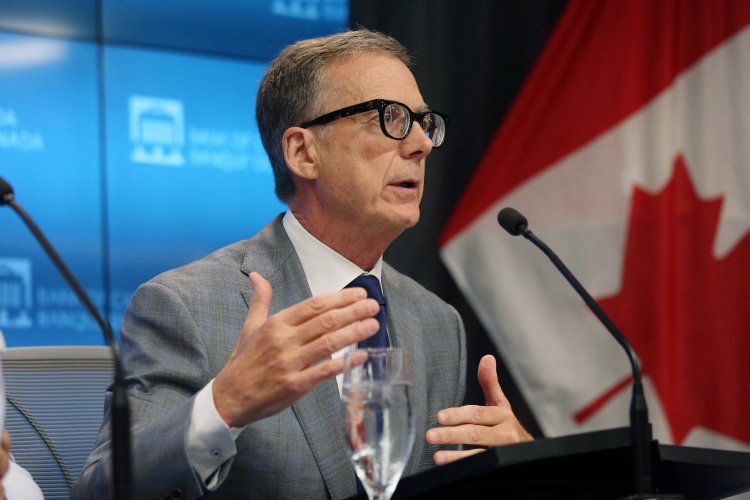Bank of Canada Governor on Trump’s tariffs: Creating a once-in-a-century economic shock
Tiff Macklem has issued a warning that the trade war has the potential to drive Canada into a recession lasting a year.

“The Canadian economy ended 2024 in good shape,” Governor Tiff Macklem remarked on Wednesday during an interest rate announcement that kept current rates unchanged.
“Since January, we've had a seismic shift in U.S. trade policy and a sharp increase in uncertainty. New tariffs are now in place on key Canadian industries and on every other U.S. trade partner. Financial markets in Canada and around the world have violently repriced and remain volatile,” he stated.
This grim economic assessment came just hours before the first of two federal leaders’ debates in the Canadian federal election. The campaign has been heavily centered on Trump’s economic measures impacting Canada, as well as which candidate is better equipped to negotiate with his administration following the elections on April 28.
“This is an unprecedented shock in more than 100 years,” Macklem observed.
“Giving Canadians a false sense of precision would not be doing Canadians a good service. Look, I think everybody's feeling this uncertainty. I think everybody is watching the daily announcements coming out of the White House and seeing the — you know — the erratic, unpredictable course of U.S. trade policy,” he explained.
The Canadian election features Liberal Leader Mark Carney—who previously served in Macklem’s role during the 2008-09 recession and later became the governor of the Bank of England amid the 2016 Brexit crisis—against Conservative Leader Pierre Poilievre, a long-time lawmaker advocating for change after nearly a decade of Liberal governance.
Macklem characterized Trump’s actions as a disruption not seen in a century, suggesting it could lead Canada into a yearlong recession with rising inflation and unemployment, supply chain issues, and potential bankruptcies for “some exporters.”
He indicated that this situation has compromised the bank's fundamental role of predicting economic trends and adjusting policies and interest rates accordingly, rendering it “really of little use for anything.”
However, Macklem presented two potential scenarios: in the first, if “most of the new tariffs are negotiated away,” economic growth could impede but eventually show “moderate” expansion in an otherwise weak economy.
“In scenario two, we assume a long-lasting trade war, the economic consequences are severe… and the economy is in recession for a year. Growth gradually returns in 2026 but remains soft through 2027 as U.S. tariffs permanently reduce Canada's potential output and lower our standard of living,” he outlined.
Macklem noted that these scenarios are merely two among many possibilities.
He also mentioned his upcoming trip to Washington for the spring meetings of the International Monetary Fund and anticipated significant discussions on these matters.
As the election campaign took a pause on Tuesday, leaders prepared in Montreal for their first televised debate in French, before facing the cameras again on Thursday for the English-language version.
Recent polling by Nanos indicates the Liberals hold a solid lead over the Conservatives, raising the stakes for Poilievre, who has an advantage with his French-speaking abilities compared to Carney.
Both candidates have expressed intentions to contact Trump immediately after the election to initiate comprehensive renegotiations with the U.S.
Trump’s global economic maneuvers have transformed Canadian politics, overturning what used to be a 20-point lead for the Conservatives. Carney recently succeeded Justin Trudeau as Canada’s prime minister.
Previously, Trudeau had faced Trump’s provocative online comments, as the U.S. president escalated his rhetoric about making Canada the 51st state and belittled the former prime minister by calling him a “governor.”
However, following a phone call with Carney on March 28, it appeared that Trump had softened his tone toward Canada, calling the new leader “Mark” and referring to him as “prime minister.”
Trump’s spokeswoman dispelled any notion within Canada that the president had retreated from his repeated threats to impose economic pressure to annex Canada.
"The president still maintains his position,” Karoline Leavitt stated on Tuesday. “The United States has been subsidizing Canada's national defense, and he believes that Canadians would benefit greatly from becoming the 51st state of the United States of America.”
Ian Smith for TROIB News
Find more stories on Business, Economy and Finance in TROIB business












